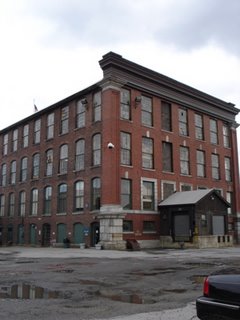
Today I was in Lawrence, Massachusetts, an old mill town near the New Hampshire border. In its heyday, Lawrence was a mighty textile town, employing tens of thousands of immigrants and others in the mills. Of course, the laborers who worked 56-hour weeks didn't enjoy the prosperity of the boom years. When working on an American history book a few years ago, I first learned about the Bread and Roses Strike of 1912. Such a significant event in labor history--and such a testament to the courage of the workers to keep the strike going in dismal and often violent conditions. This part of labor history was never taught in the history classes I had in school. Back then, industrialization was taught from the vantage point of the wealthy factory owners. Industrialization was seen as the great salvation, bringing this nation from the backwardness of near-frontier conditions and catalpulting the United States to the forefront of the world economy. But we never learned about what it was like to be the ones running the machines.

I was in Lawrence today to visit Malden Mills, makers of Polartec fleeces. They have a wonderful outlet store there where you can get the real McCoy at good prices. I'm making a few Christmas presents, and fleece from the dreadful chain fabric stores just would not do. So I trekked north.
In some ways, Lawrence is much as it ever was. It's still a city of immigrants. Today, though, the immigrants speak Spanish instead of Italian. And though you still see the massive brick mills across town, most of them seem to have been converted to other uses. But Malden Mills is still going strong.
In 1995, it didn't look that way. The mill was devastated by fire, and everyone assumed it would be just one more mill to close up and send its work down south or overseas. But the owner, Aaron Feuerstein, vowed to rebuild. Not only that, he paid his workers while the rebuilding was taking place. It was an extraordinary thing for a businessman to do--I remember hearing about it on the news when I lived in Texas, long before I had any connection to Massachusetts. What other company can you imagine would consider its employees to be such an asset that it would protect them in that way? Feuerstein was lionized for his actions and given the nickname the "Mensch of Malden Mills."
 I know things have changed since the rebuilding. Feuerstein no longer runs Malden Mills, because the high cost of rebuilding and safeguarding the workers cost him control over the mill. And I heard that the company went through bankruptcy proceedings a few years ago. But I'm still in awe of what happened, and to me, it's worth going out of my way to give them my business.
I know things have changed since the rebuilding. Feuerstein no longer runs Malden Mills, because the high cost of rebuilding and safeguarding the workers cost him control over the mill. And I heard that the company went through bankruptcy proceedings a few years ago. But I'm still in awe of what happened, and to me, it's worth going out of my way to give them my business.


1 comment:
I first heard of the Bread and Roses strike, while working at a public library reference desk about four years ago, and a high school student came in looking for materials on it.
As a weaver it'd be a fascinating place to visit.
Post a Comment